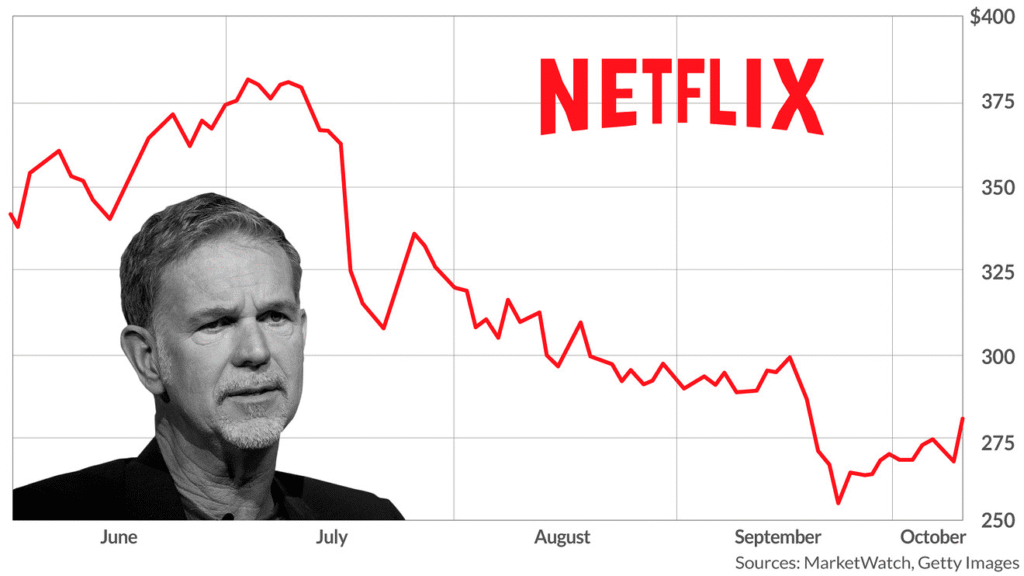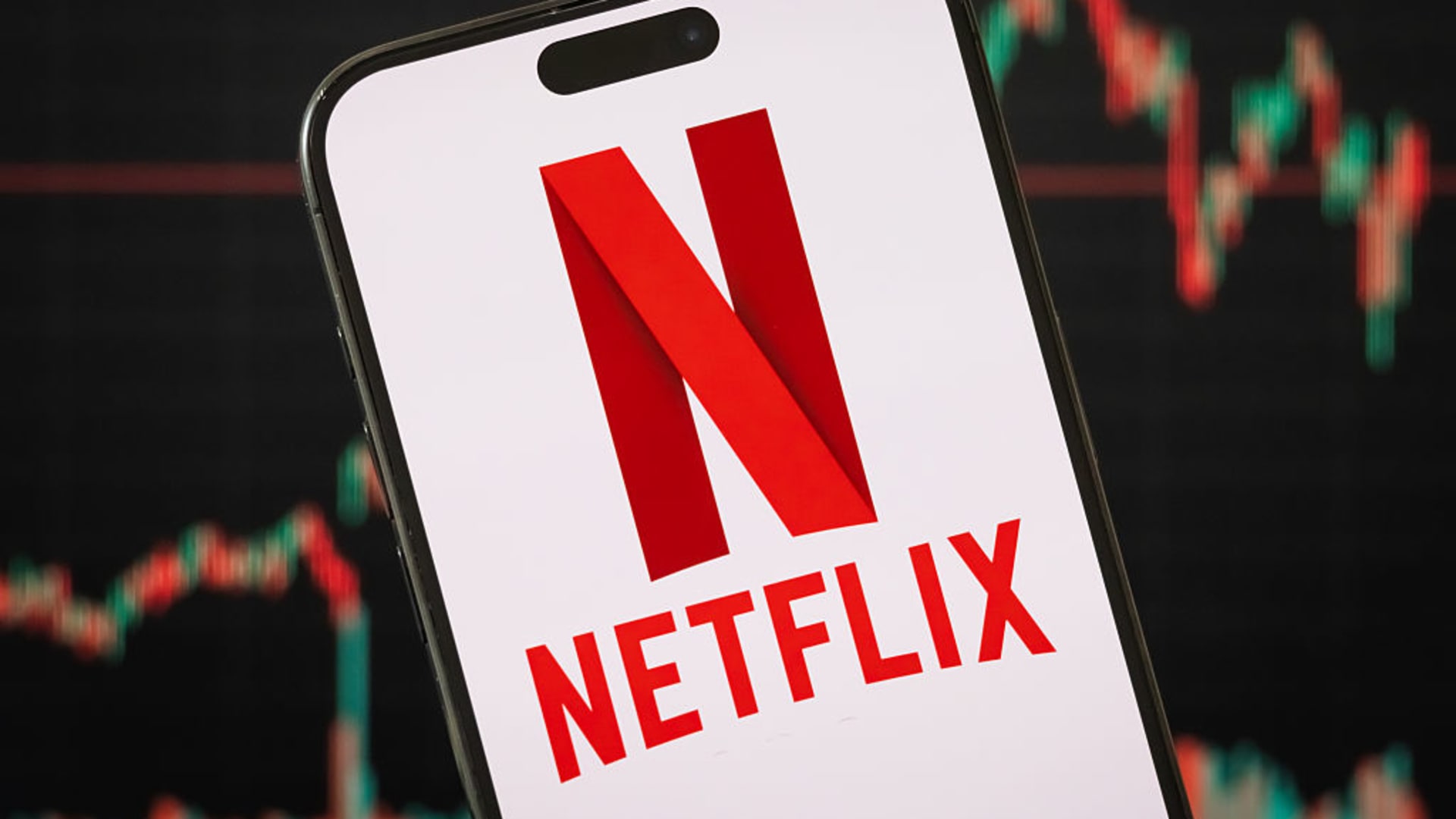
The global entertainment industry is reeling after a shocking announcement by President Donald Trump on May 5, 2025, in which he declared a new policy that would impose a 100% tariff on all films produced outside the United States. This decision, which is aimed at curbing the influx of foreign films into the U.S. market, has sent shockwaves through Hollywood and beyond. The immediate consequences of this decision were felt across Wall Street, as shares of major media companies like Netflix, Disney, and Warner Bros. Discovery experienced sharp declines. This article delves into the details of the tariff, its implications for the entertainment sector, and the broader effects on international trade.
The Immediate Impact on Stock Prices
The most immediate reaction to President Trump’s announcement was felt in the stock market. Shares of major entertainment conglomerates dropped significantly, with Netflix’s stock falling by over 4%, dipping to an intraday low of $1,107.01 per share. Similarly, Warner Bros. Discovery saw a dramatic drop of 5.4%, reaching $8.075 per share, while Disney’s stock plummeted 3%, closing at $89.89 per share. This marked a stark contrast to the bullish momentum that these companies had seen earlier in the year.
The broader market also suffered a hit, with the Nasdaq Composite falling by 0.57% and the S&P 500 losing 0.50%. While the stock market often responds to a wide variety of factors, the sharp declines in the media sector indicated the deep concern among investors about the potential long-term effects of Trump’s tariff threat. With these companies reliant on global content, a sudden shift in trade policy could disrupt the very foundation of their business models, causing uncertainty in the market.
The Tariff’s Core: A Move Against Foreign Films
At the heart of Trump’s announcement is the imposition of a 100% tariff on films produced outside the U.S. The president framed this as a necessary measure to protect American culture and intellectual property from foreign influence. In his statement, Trump argued that foreign governments have been subsidizing the production of films in their own countries, thereby giving their films an unfair advantage in international markets. He suggested that this policy was crucial for reviving the domestic film industry, which he claims has been negatively affected by global competition.
Trump’s remarks about national security, citing foreign-made films as a potential avenue for foreign governments to influence American values and ideas, have sparked a heated debate in the entertainment world. Many have expressed concern that the tariff is less about protecting U.S. intellectual property and more about creating a barrier to entry for foreign productions. For instance, films made in countries like Canada, the UK, and Australia often benefit from tax incentives that make them more affordable to produce. By imposing a heavy tariff on these films, the U.S. government could essentially drive up the cost of foreign films, making them unaffordable for many production companies.
Implications for Streaming Giants: Netflix at the Forefront
Netflix, one of the leading streaming platforms globally, is perhaps the most vulnerable to this new tariff policy. The company has made a significant push in recent years to produce content outside of the United States, with productions in various countries, including India, South Korea, and several European nations. Netflix’s global expansion strategy relies heavily on the international appeal of its original content. Popular series like Money Heist (Spain), Sacred Games (India), and Dark (Germany) have helped Netflix capture a diverse audience worldwide.
However, with the imposition of a 100% tariff on foreign-made films, Netflix’s ability to offer its subscribers a vast array of international content is now under threat. Should the tariff remain in place, Netflix may be forced to either absorb the costs of the tariff or pass them on to consumers through higher subscription prices. This could result in a backlash from subscribers who are already feeling the pinch from rising costs of living.
The tariff could also prompt Netflix to reconsider its investment in international content production. If foreign films and TV shows become significantly more expensive to produce and distribute, Netflix may be forced to scale back its international programming. This would mark a significant departure from its current business model, which emphasizes global content diversification. In turn, this could erode the company’s competitive edge in a market that is increasingly reliant on international content.
Disney and Warner Bros. Discovery: A Similar Story

While Netflix may be the most prominent streaming service affected by Trump’s tariff policy, other media giants like Disney and Warner Bros. Discovery are also facing significant challenges. Disney, with its vast portfolio of content, including international franchises such as Star Wars and Marvel, relies on the global market for a substantial portion of its revenue. The company’s theme parks in Europe and Asia, as well as its international streaming service Disney+, are all built around content that often involves international production partnerships.
For Disney, the tariff could lead to higher costs for its foreign productions, potentially making international collaborations less financially viable. The company’s push to expand its global presence, particularly in emerging markets like China and India, could be hampered if foreign films become prohibitively expensive to produce and distribute. As a result, Disney may be forced to shift its focus to U.S.-based content, limiting the diversity of its offerings on Disney+ and other platforms.
Warner Bros. Discovery, known for its blockbuster franchises like Harry Potter and DC Comics, is also heavily invested in international content. The company has long relied on foreign markets for a significant portion of its revenue, with films often grossing millions of dollars abroad. A 100% tariff on foreign-made films could disrupt this revenue stream, forcing Warner Bros. Discovery to reassess its global strategy.
The potential for retaliation by other countries is also a significant concern. If other nations decide to impose tariffs on U.S.-made films in response, it could create a vicious cycle of escalating trade barriers that would hurt all players in the entertainment industry. With foreign markets becoming more difficult to access, companies like Disney and Warner Bros. Discovery may see their international box office returns diminish, leading to a more localized entertainment market.
Global Film Industry at a Crossroads
The ramifications of Trump’s tariff on foreign films extend far beyond the U.S. border. The global film industry is deeply interconnected, with international collaborations being a cornerstone of modern filmmaking. Many of the largest films in the world, from Avengers: Endgame to The Lion King, have involved extensive international collaboration, whether in terms of financing, filming, or distribution. The new tariff policy threatens to upend this delicate balance, as production companies in countries like the UK, Canada, and Australia may face new financial barriers when trying to sell their films in the U.S. market.
The consequences of these tariffs could also be felt by independent filmmakers, who often rely on international distribution deals to reach global audiences. If foreign films are subjected to higher tariffs, independent filmmakers may find it more difficult to secure distribution deals in the U.S. market. This could stifle creativity and limit the diversity of content available to U.S. audiences. The rich tapestry of international cinema, from Bollywood to Korean dramas, could become harder to access, potentially narrowing the scope of available entertainment.
Moreover, the tariff could lead to a significant shift in the global distribution model. If foreign films become too expensive to import into the U.S., it could lead to a resurgence of local film industries, particularly in countries like India, South Korea, and China, where the film industry has been growing rapidly in recent years. These countries may begin to focus more on domestic content production, further fueling the rise of regional streaming platforms that cater specifically to local tastes.
Conclusion: A Major Challenge for the Entertainment Industry
President Trump’s 100% tariff on foreign-made films marks a major turning point for the global entertainment industry. With streaming platforms like Netflix and Disney+ at the forefront of the battle, and major studios like Warner Bros. Discovery facing significant challenges, the impact of this policy is likely to be far-reaching. While the U.S. government positions the tariff as a way to protect domestic filmmakers, the global film industry may see this as an attack on the interconnected nature of modern media production.
As companies like Netflix, Disney, and Warner Bros. Discovery grapple with the immediate effects of this policy, they will need to consider how to adapt their strategies to maintain their global dominance. Whether this means increasing domestic production, absorbing the cost of the tariff, or raising subscription prices remains to be seen. One thing is clear: the entertainment industry is facing a period of uncertainty that will have lasting consequences for years to come.
The next few months will be critical in determining whether the 100% tariff will remain in place or if it will be scaled back. As stakeholders continue to assess the implications of this policy, the global media landscape is poised for a major transformation. The only certainty is that the entertainment industry, in all its forms, will never be the same again.

